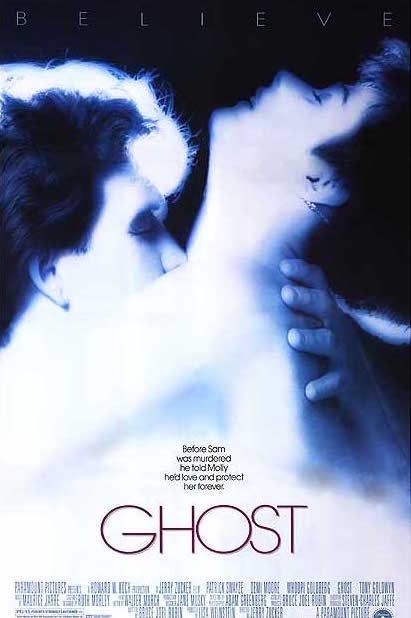|
GHOST (1990)
IMDb The original idea for Ghost was just a question: What would it be like to tell a ghost story from the side of the ghost? I was very drawn to the idea that life doesn’t start at birth or end at death, but I didn’t know how to dramatize that. Then one day I was watching a production of Hamlet and I saw the ghost of Hamlet’s father standing on the parapet telling his son to avenge his death. That’s when I got the idea of making the story about a ghost trying to solve his own murder. I wrote a treatment and showed it to my wife, Blanche. Up to that point, all of my treatments were like outlines for novels. This one was very sparse, very simple. Blanche looked at it and said, “This is a movie.” That’s when I understood how simple movies really are. I spent two years pitching Ghost, trying to sell the idea in a short presentation to studio executives. At first, everyone kept saying no. Over time, I honed my pitching skills. I realized that studio execs were like jaded kindergarteners that listened to story ideas all day long. The hard part was holding their attention. Then I figured it out. The moment Sam gets shot, I clapped my hands really loud, enough to startle everyone listening. It worked every time. From that moment I had their full attention for about two minutes—long enough to deliver the story. As I continued to pitch it, the story became richer and richer, and I became more and more connected to it. By my final week of pitching, I really had it down to an art. My agent set up five meetings at five different studios. At Paramount, we pitched it to a producer named Lisa Weinstein. While I was telling her the story, she started crying. I thought, I want to make my movie with her. And I did. Lindsay Doran, a VP at the studio (and someone who has been an angel in my life ever since) sold the project to Dawn Steele, the president of Paramount. Dawn said yes, and I started writing the script. That was the beginning of the best experience I ever had in Hollywood. Director Jerry Zucker and I had been writing and re-writing the script for a year. The only thing we couldn’t figure out was the final scene. Jerry said, “We need a line of dialogue at the end of the movie—something people will remember.” We called it the Casablanca line. I kept thinking and thinking, but I couldn’t come up with the right line. Then one day we were driving to the pharmacy to get some medicine for my son Ari. We were talking about Molly and Sam’s loss at the end of the movie—the loss of their relationship—and I said, “You can’t take it with you.” Then right away, I said, “Wait a minute. You can take it with you. The love inside—you take it with you.” Jerry yelled out, “That’s it! That’s it! That’s the line!” If I leave any kind of legacy when I die, it might be that line. “The love inside—you take it with you.” |
